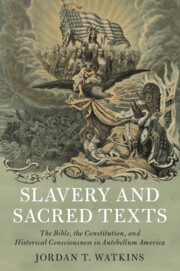 Slavery and Sacred Texts
Slavery and Sacred Texts Book contents
- Slavery and Sacred Texts
- Cambridge Historical Studies in American Law and Society
- Slavery and Sacred Texts
- Copyright page
- Dedication
- Contents
- Acknowledgments
- Prologue
- Introduction
- 1 “Recourse Must Be Had to the History of Those Times”
- 2 “The Ground Will Shake”
- 3 “Texts … Designed for Local and Temporary Use”
- 4 “The Further We Recede from the Birth of the Constitution”
- 5 “The Culture of Cotton Has Healed Its Deadly Wound”
- 6 “Times Now Are Not as They Were”
- 7 “We Have to Do Not … with the Past, but the Living Present”
- 8 A “Modern Crispus Attucks”
- Conclusion
- Epilogue
- Index
2 - “The Ground Will Shake”
Published online by Cambridge University Press: 12 June 2021
- Slavery and Sacred Texts
- Cambridge Historical Studies in American Law and Society
- Slavery and Sacred Texts
- Copyright page
- Dedication
- Contents
- Acknowledgments
- Prologue
- Introduction
- 1 “Recourse Must Be Had to the History of Those Times”
- 2 “The Ground Will Shake”
- 3 “Texts … Designed for Local and Temporary Use”
- 4 “The Further We Recede from the Birth of the Constitution”
- 5 “The Culture of Cotton Has Healed Its Deadly Wound”
- 6 “Times Now Are Not as They Were”
- 7 “We Have to Do Not … with the Past, but the Living Present”
- 8 A “Modern Crispus Attucks”
- Conclusion
- Epilogue
- Index
Summary
This chapter shows that biblical criticism encouraged some figures, including Ralph Waldo Emerson and Theodore Parker, to abandon what they perceived as transient historical grounds for what they understood as a transcendent moral sphere. Many scholars have stressed the ahistorical aspects of Transcendental belief and emphasized the ways in which Transcendentalism outgrew its Unitarian roots. In doing so, however, they have often neglected to note how historical arguments freed heterodox thinkers such as Emerson and Parker in their attempts to build atemporal worlds. While most biblical scholars used historical readings to ground universal truths in a biblical past, these Transcendentalists employed historical explication to unmoor such truths from that historical setting. The growing perception of historical distance assisted them in that effort. As these and other thinkers drew attention to the shiftiness of historical evidence, the limitations of time, and the remoteness of the past, they exposed the transience of the historical grounds on which American Protetants based their faith.
Keywords
- Type
- Chapter
- Information
- Slavery and Sacred TextsThe Bible, the Constitution, and Historical Consciousness in Antebellum America, pp. 69 - 108Publisher: Cambridge University PressPrint publication year: 2021
